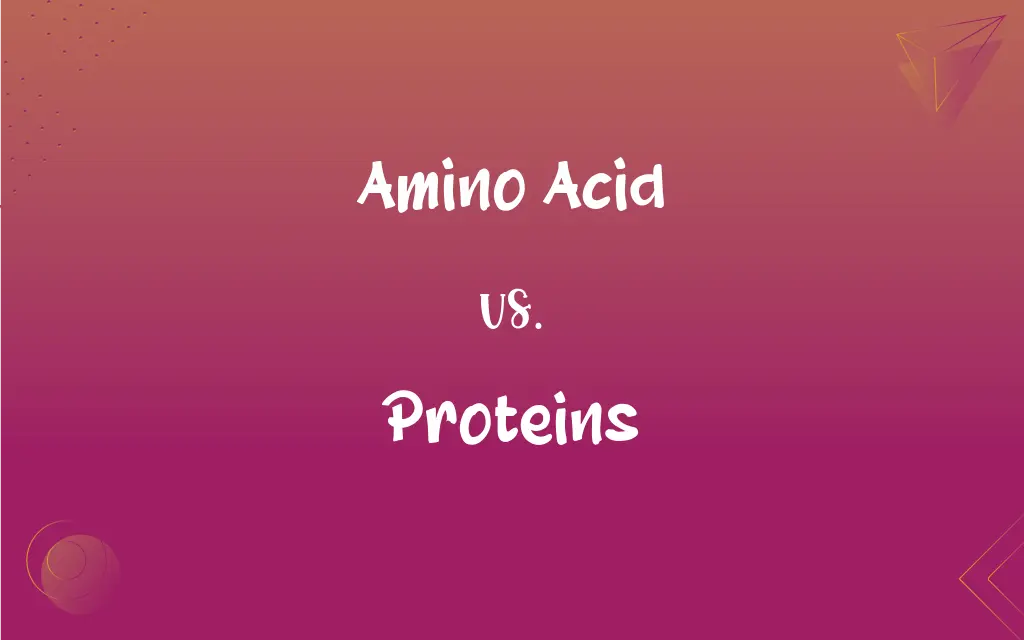Amino Acid vs. Proteins: What's the Difference?
Edited by Aimie Carlson || By Harlon Moss || Updated on October 28, 2023
Amino acids are the building blocks of proteins, while proteins are complex molecules made up of chains of amino acids.

Key Differences
Amino acids are organic compounds that serve as the fundamental building blocks for proteins. Without amino acids, proteins wouldn't exist, emphasizing their interdependence.
In terms of complexity, amino acids are simpler molecules, consisting of an amino group, a carboxyl group, and a side chain. On the other hand, proteins are larger, complex structures formed when multiple amino acids are linked together through peptide bonds.
There are 20 standard amino acids that can be combined in various sequences to create proteins. Each protein has a unique sequence of amino acids, determining its specific function and structure in an organism.
While amino acids can exist independently and serve other functions in the body such as neurotransmitter synthesis or energy production, proteins specifically denote long chains or complexes of amino acids folded into specific three-dimensional shapes.
The body can produce some amino acids on its own, termed non-essential, while essential amino acids must be obtained from the diet. Proteins, in contrast, are synthesized by the body as needed, using the available amino acids from food and internal processes.
ADVERTISEMENT
Comparison Chart
Size and Complexity
Small, simple molecules
Large, complex molecules
Function
Building blocks for proteins, neurotransmitters
Structural, enzymatic, regulatory roles
Variety
20 types in the human body
Countless variations
Independence
Can exist independently
Composed of amino acid chains
Role in Body
Beyond protein synthesis, neurotransmitter function
Essential for most biological processes
ADVERTISEMENT
Amino Acid and Proteins Definitions
Amino Acid
Essential and non-essential types.
Humans must obtain essential amino acids through diet.
Proteins
Essential for growth and repair.
Dietary proteins are vital for muscle repair and growth.
Amino Acid
Organic compounds forming proteins' building blocks.
The amino acid tryptophan is crucial for serotonin production.
Proteins
Play diverse roles in the body.
Enzymes, a type of protein, catalyze biochemical reactions.
Amino Acid
Contains an amino group and a carboxyl group.
Each amino acid has a unique side chain affecting its properties.
Proteins
Large, complex molecules composed of amino acids.
Proteins like collagen provide structural support to tissues.
Amino Acid
Twenty types in the human body.
Amino acids like leucine and valine are important for muscle growth.
Proteins
Found in all living organisms.
Proteins are present in every cell and perform various functions.
Amino Acid
Participates in various metabolic pathways.
Amino acids are involved in synthesizing hormones and neurotransmitters.
Proteins
Have specific structures determining their functions.
Hemoglobin, a protein, has a specific structure allowing oxygen transport.
Proteins
Any of a group of complex organic macromolecules that contain carbon, hydrogen, oxygen, nitrogen, and usually sulfur and are composed of one or more chains of amino acids. Proteins are fundamental components of all living cells and include many substances, such as enzymes, hormones, and antibodies, that are necessary for the proper functioning of an organism. They are essential in the diet of animals for the growth and repair of tissue and can be obtained from foods such as meat, fish, eggs, milk, and legumes.
Proteins
Plural of protein
FAQs
Are amino acids only found in proteins?
While amino acids are primary components of proteins, they also play other roles in the body, such as neurotransmitter function and energy production.
How many standard amino acids are there?
There are 20 standard amino acids.
What's the difference between essential and non-essential amino acids?
Essential amino acids cannot be synthesized by the body and must be obtained from the diet, whereas non-essential amino acids can be produced by the body.
What determines the properties of an amino acid?
The properties of an amino acid are largely determined by its unique side chain (R group).
Can amino acids form structures other than proteins?
Yes, amino acids can also form peptides, which are smaller chains, and play roles in functions like hormone and neurotransmitter activity.
How are proteins synthesized?
Proteins are synthesized in cells by ribosomes using instructions from DNA through a process called translation.
What is the general structure of an amino acid?
An amino acid has a central carbon atom bonded to an amino group (-NH2), a carboxyl group (-COOH), a hydrogen atom, and a unique side chain (R group).
What determines a protein's function?
A protein's function is determined by its unique shape and sequence of amino acids.
What are amino acids?
Amino acids are organic compounds that serve as the building blocks of proteins.
What are proteins?
Proteins are large biomolecules made up of chains of amino acids, playing various roles in the body, from structural to enzymatic functions.
How do proteins differ from each other?
Proteins differ in their sequence of amino acids, structure, size, and function.
Can proteins be used as an energy source?
Yes, if necessary, proteins can be broken down into amino acids, which can be used for energy.
What role do proteins play in the immune system?
Proteins play key roles in the immune response, such as antibodies which recognize and neutralize foreign substances.
How are dietary proteins digested?
Dietary proteins are broken down into amino acids by enzymes in the stomach and small intestine.
Do all organisms use the same set of amino acids?
Most organisms use the same 20 standard amino acids, but some organisms can utilize non-standard amino acids as well.
What's the role of amino acids in muscle growth and repair?
Amino acids are crucial for muscle protein synthesis, aiding in the repair and growth of muscle tissues.
What is protein denaturation?
Protein denaturation is the process where a protein loses its structure and functionality, often due to external factors like heat or pH changes.
Are all proteins enzymes?
No, while all enzymes are proteins, not all proteins are enzymes.
What is the relationship between genes and proteins?
Genes contain the instructions (DNA sequences) to produce specific proteins.
Are all amino acids soluble in water?
Most amino acids are soluble in water, but their solubility can vary based on their side chains.
About Author
Written by
Harlon MossHarlon is a seasoned quality moderator and accomplished content writer for Difference Wiki. An alumnus of the prestigious University of California, he earned his degree in Computer Science. Leveraging his academic background, Harlon brings a meticulous and informed perspective to his work, ensuring content accuracy and excellence.
Edited by
Aimie CarlsonAimie Carlson, holding a master's degree in English literature, is a fervent English language enthusiast. She lends her writing talents to Difference Wiki, a prominent website that specializes in comparisons, offering readers insightful analyses that both captivate and inform.































































